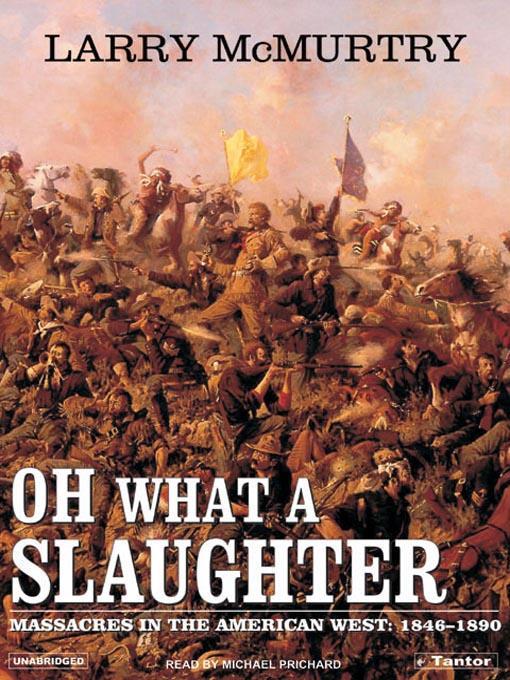
Oh What a Slaughter
Massacres in the American West: 1846—1890
فرمت کتاب
audiobook
تاریخ انتشار
2005
نویسنده
Michael Prichardناشر
Tantor Media, Inc.شابک
9781400171958
کتاب های مرتبط
- اطلاعات
- نقد و بررسی
- دیدگاه کاربران
نقد و بررسی

Of massacre, the noun, the Oxford Dictionary suggests butchery, general slaughter, or carnage. Thus starts the latest of Pulitzer Prize winner Larry McMurtry's books about the taming of the American West. In his rich and graphic prose, he details the most famous and violent killings between 1840 and 1890. Both settlers and American Indians were victims. Narrator Michael Prichard keeps himself unemotional as he describes women's private parts being made into hatbands and Sitting Bull being shot, along with dozens of other Sioux, during his surrender at Wounded Knee. Listeners hoping for a little disgust or even excitement from the reader will never hear it. Although Prichard's distinct voice keeps a pleasant pace, he misses a sumptuous opportunity to embellish McMurtry's skill. J.A.H. (c) AudioFile 2007, Portland, Maine

October 10, 2005
Pulitzer Prize–winning novelist McMurtry (Lonesome Dove
) recounts six Western frontier massacres in this meandering mixture of memoir, literary criticism, jeremiad and history. "In most cases," McMurtry acknowledges, "the only undisputed fact about a given massacre is the date on which it occurred." Rightly enough, such disputes don't keep him from approaching these subjects with strong opinions. "Whites killed whites" at Mountain Meadows (1857); "a camp of one hundred percent peaceful Indians" was attacked at Sand Creek (1864). At Marias River (1870), Blackfeet Indians "dying anyway" of smallpox were slaughtered, and at Camp Grant (1871) "all the people killed—excepting one old man and a 'well-grown' boy—were women and children." McMurtry's easygoing voice and hop-and-skip pace leave comprehensiveness to the many books to which he refers, but his own volume would have been stronger, and more accessible to readers unfamiliar with frontier history, if it had been organized more systematically. As is, the book feels tossed off, and his passing references to contemporary massacres—in Rwanda, New York and Iraq, for example—don't add much resonance. Agent, Andrew Wylie.

























دیدگاه کاربران